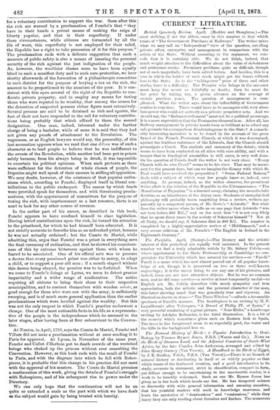CURRENT LITERATURE.
British Quarterly Review. April. (Hodder and Stoughton.)—The most striking, if not the ablest, essay in this number is that which treats of "The Government Purchase of Railways." The writer takes what we may call an "Independent" view of the question, exblling private effort, enterprise, and management in comparison with the action of the State. Without assenting to the argument, we con- cede that it is certainly able. We do not think, indeed, that much weight attaches to the difficulties about the value of debentures and preference stocks. Pecuniary problems quits as difficult, though not of such magnitude, have been solved before. And besides, this is a case in which the holder of such stock might get his bonus without loss to the State. As to the " taking-over " price of these and other stocks, there is a difficulty. The Premier who brings in the measure must keep the secret as faithfully as death ; then ho must fix the price by taking, say, a given advance on the average of certain previous years. The question of management is com- plicated. What the writer says about the inflexibility of Government routine is very true. There would have to ba managers with very abso- lute power who could act as freely as a private proprietor acts. And we should say, the "Railmaster-General" must not be a political personage. It is a more superstition that the Postmaster-General is so. After all, has Railway management in private hands been so brilliant as to afford any safe grounds for a comparison disadvantageous to the State ? A remark- ably interesting narrative is to be found in the account of the great Synod of the French Protestant Church, at which it was determined, against the fruitless resistance of the Liberals, that the Church should promulgate a Creed. The analysis and summary of the debate, which seems to have been conducted on all sides with rare ability, and with a temper that in theological assemblies is still rarer, is very well done. On the question of Creeds itself the writer is not very clear. "Every Church with its own Creed" seems to be his view. That may be neces- sary for the present days, but can we imagine the dismay with which St. Paul would have received the proposition ? "Swiss Federal Reform" deals with a subject of which very few people know or, indeed, care anything. At present, indeed, as the writer observes, the prominent Swiss affair is the relation of the Republic to the Ultramontanos. " The Monotheism of Paganism " is a learned essay, claiming the monotheistic doctrine as an inheritance of the Aryan race. Students of metaphysical philosophy will probably learn something from a review, written ap- parently by a competent person, of Mr. Grote's " Aristotle." But what does the writer mean when he tells us on one page that Aristotle "was not born before 392 B.C.," and on the next that " it is not very likely that he spent three years in the society of Sokrates himself "? Not at all likely, we should say, if Sokrates died in 400 B.C. The number is completed by a highly-appreciative review of "Middlemarch," and a very severe criticism of Mr. Froude's " The Ruglish in Ireland in the Eighteenth Century."


































 Previous page
Previous page